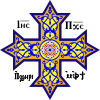Pope Agatho of Alexandria
This article will address the topic of Pope Agatho of Alexandria, which is of great relevance today. Pope Agatho of Alexandria has gained great importance in various areas, generating interest and debate among experts and the general public. Over the years, Pope Agatho of Alexandria has sparked a series of investigations, theories and reflections that have enriched knowledge around this topic. Likewise, Pope Agatho of Alexandria has generated various positions and opinions that reflect the diversity of perspectives that exist on the matter. In this article, different aspects related to Pope Agatho of Alexandria will be analyzed, as well as its implications and repercussions in today's society.
Saint Agathon of Alexandria | |
|---|---|
| Pope of Alexandria & Patriarch of the See of St. Mark | |
| Papacy began | 661 or 662 |
| Papacy ended | 677 or 680 |
| Predecessor | Benjamin I |
| Successor | John III |
| Personal details | |
| Born | |
| Died | 26 October 680 Egypt |
| Nationality | Egyptian |
| Denomination | Coptic Orthodox Christian |
| Sainthood | |
| Feast day | 26 October (16 Babah in the Coptic calendar) |
Saint Agathon of Alexandria, was the 39th Pope of Alexandria & Patriarch of the See of St. Mark. St. Agathon was a disciple of Pope Benjamin I, the 38th Pope of the Coptic Orthodox Church so when Pope Benjamin had to flee to avoid persecution by the Chalcedonians, Agathon remained and led the church.
Agathon served like this until Pope Benjamin returned and died, at which time Agathon was officially named the pope of the Coptic Orthodox Church. This happened during the time of the Muslim conquest of Egypt and when Muawiyah I was ruling. Unlike most popes who first serve as monks, Agathon had never been a monk prior to becoming pope- yet he was successful. During his time as pope, the building of St. Macarius Church in the monastery at Wadi El Natrun was completed.
Like many others before and after, according to the Coptic Orthodox Church, he was harassed. Sometime during his papacy, he was persecuted by a Melkite Byzantine Patriarch named Theodocius, who through his authority, levied large taxes on Agathon, made the people hate him and asked that he be killed. For this reason, Agathon stayed hidden in his cell until the threat of Theodocius went away. Based on church beliefs, he chose his successor based on a dream where an angel told him who should follow him.
References
- ^ a b c d e Morgan, Robert (September 21, 2016). History of the Coptic Orthodox People and the Church of Egypt. FriesenPress. ISBN 9781460280270. Retrieved 20 November 2016.
- ^ a b c Meinardus, Otto Friedrich August (2002). Two Thousand Years of Coptic Christianity. American Univ in Cairo Press. p. 275. ISBN 9789774247576. Retrieved 20 November 2016.
- ^ a b c d "The Departure of St. Agathon, 39th Pope of Alexandria". Coptic Church Network. Archived from the original on 21 November 2016. Retrieved 20 November 2016.
- ^ a b Atiya, Aziz Suryal. Pope in the Coptic Church. The Coptic encyclopedia, volume 6. p. 3. Archived from the original on 20 November 2016. Retrieved 20 November 2016.
- ^ "Pope in the Coptic Church". Claremont Coptic Encyclopedia. Archived from the original on 20 November 2016. Retrieved 20 November 2016.
